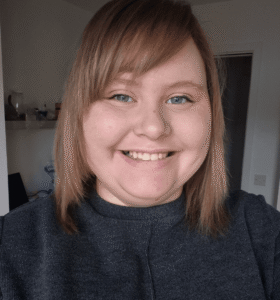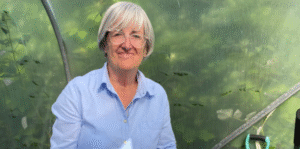
Fee Brown
Communications Manager
Lived experience: the people power we need for change
Being able to spotlight the voices of people with lived and living experiences is a privilege. Everyone’s situation is unique, but time and again I see people’s experiences touching on similar ideas: being listened to, validated, not being judged, finding a voice to self-advocate.
Though sometimes, it does feel like it’s the seemingly simple things that can have a big impact on someone.
Nicole spoke in her film about hospital being a scary place. She says that the Edinburgh Crisis Centre gave her a place of safety and comfort. The support helped to make life bearable for her. Bearable might not seem like a huge win. But for Nicole it means she can be ok with life in the present moment, and she talks about how being a poet helps her to own her experiences.
Or as Darren puts it, “they helped me feel cared for”.
Why do we share people’s lived experiences in this way? Because we need to create a space for people like Nicole and Darren to be heard. Catherine’s experience in particular really hit home for me when I think about our work in challenging misconceptions around what mental ill health is (or isn’t!).
Catherine shared her journey with us as a blog and she talked about a visit to Kelvingrove Art Gallery our team were able to arrange for her.
She’d visited the gallery 51 years earlier and it became a place of safety in her mind during a very difficult and dark period of mental ill health. She described how, for the first in time in 30 years, she felt like a new person. The visit was very special for Catherine because she had been living with a life limiting illness, and she explained how she’d be able to look back at the photos she took of the day when she becomes unwell. She knew she’d be able to remember the fun she had and how good she felt. I got the sense from her at the time that she took real comfort in that.
People’s lived experiences embedded in mental health services should be the default setting
Catherine said in her blog:
“We spent time looking at the paintings that I had seen 51 years ago, it was amazing! For the first time in over 30 years I felt like a new person, I felt respectable due to my new clothes and appearance. People spoke to me and I felt “normal”.
“I had a meal in the restaurant (a first for many years) I really enjoyed my meal and again felt normal sitting with other members of the public, I didn’t feel any different from anyone else which is something that I thought would never happen.”
When I first read Catherine’s blog, this particular extract affected me deeply and it still does.
This shared account of Catherine’s life experiences is another step towards challenging negative attitudes and misinformation. Her blog is also a reminder of how far we’ve come in terms of attitudes around mental ill health, and the vast improvements in mental health services over the years. And although there are loads great things happening, there’s still a way to go to ensure that the voice of lived experience is truly being given the recognition it deserves across the board both for policy and service design. Peer support and people’s lived experiences embedded in mental health services should be the default setting.
So for me, sharing people’s lived and living experiences isn’t just ‘a nice thing to do’. Nicole, Darren, Catherine and all the other incredible people who share with us, are the people power we need to achieve change.
This blog is published in Catherine’s memory.
For more journeys, please visit: penumbra.org.uk/your-journeys




